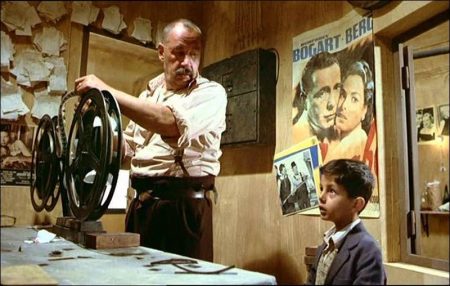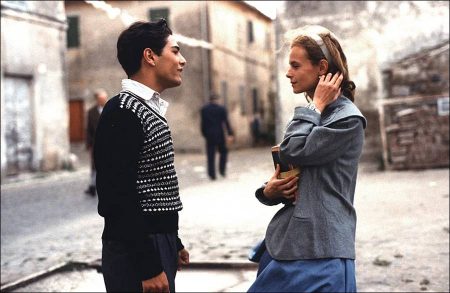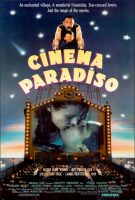Taglines: A celebration of youth, friendship, and the everlasting magic of the movies.
Cinema Paradiso movie storyline. Beginning at the end, the movie opens with Salvatore’s mother trying to inform him of the death of Alfredo. Salvatore, a filmmaker who has not been home since his youth, leaves Rome immediately to attend the funeral.
Through flashbacks we watch Salvatore in his youth, in a post WWII town in Southern Italy. As a young boy he is called Toto and he has a strong affinity for the cinema. Toto often sneaks into the movie theater when he shouldn’t and harasses the projectionist, Alfredo, in attempts to get splices of film that are cut out by the church because they contain scenes of kissing.
Toto has a younger sister and war widowed mother who often struggle due to the loss of Toto’s father. Toto is banned from the movie theater by his mother when his film bits accidentally catch fire and nearly kill his sister along with burning up the only picture Toto has of his father along with other family photographs. Eventually he sneaks his way back and forms a father-son bond with Alfredo, despite Alfredo’s reluctancy, Toto even learns how to run the projector. Meanwhile one of the townspeople wins the lotto and becomes a rich man.
One day in the cinema, after Toto leaves to watch the movie with his friends below, the film catches fire in the projector and knocks Alfredo out. Young Toto rescues Alfredo from death in the fire, unfortunately the cinema burns down and Alfredo loses his sight. Lucky the lotto-lucky-townsman pays to have a new cinema put up. Since Toto already knows how to run the projector he works with Alfredo in the projection room. Some years pass and Salvatore is now a young man.
A rich girl, Elena, comes to town and Salvatore and his friends vie for her attention. Salvatore films her and begins to fall in love. Alfredo advises him to steer clear of love because it only causes pain. Despite his warning, Salvatore confesses his love to Elena, who’s reply is that she does not, but she could. So he waits, every night outside her house for her reply.
One day he gives up and trudges home depressed and upset only to soon discover that Elena does love him in return. They begin a passionate romance, like that of two newlyweds. Unfortunately, Elena’s father doesn’t approve and so he takes Elena away. All summer they try to meet, sometimes successfully, sometimes not. On one particular day he tries to reach her and she him but their paths don’t cross.
Cinema Paradiso (Italian: Nuovo Cinema Paradiso, Italian pronunciation: [ˈnwɔːvo ˈtʃiːnema paraˈdiːzo], “New Paradise Cinema”) is a 1988 Italian drama film written and directed by Giuseppe Tornatore. The film stars Jacques Perrin, Philippe Noiret, Leopoldo Trieste, Marco Leonardi, Agnese Nano and Salvatore Cascio, and was produced by Franco Cristaldi and Giovanna Romagnoli, while the music score was composed by Ennio Morricone along with his son, Andrea. It won the Academy Award for Best Foreign Language Film at the 62nd Academy Awards.
The film exists in multiple versions. It was originally released in Italy at 155 minutes, but poor box office performance in its native country led to its being shortened to 123 minutes for international release; it was an instant success. This international version won the Special Jury Prize at the 1989 Cannes Film Festival and the 1989 Best Foreign Language Film Oscar. In 2002, the director’s cut 173-minute version was released (known in the U.S. as Cinema Paradiso: The New Version).
Cinema Paradiso (1988)
Directed by: Giuseppe Tornatore
Starring: Philippe Noiret, Enzo Cannavale, Antonella Attili, Leo Gullotta, Marco Leonardi, Agnese Nano, Salvatore Cascio, Tano Cimarosa, Pupella Maggio, Jacques Perrin
Screenplay by: Giuseppe Tornatore
Production Design by: Andrea Crisanti
Cinematography by: Blasco Giurato
Film Editing by: Mario Morra
Costume Design by: Beatrice Bordone
Music by: Ennio Morricone
MPAA Rating: R for some sexuality.
Distributed by: Miramax Films
Release Date: November 17, 1988 (Italy), February 2, 1990 (USA)
Visits: 331


